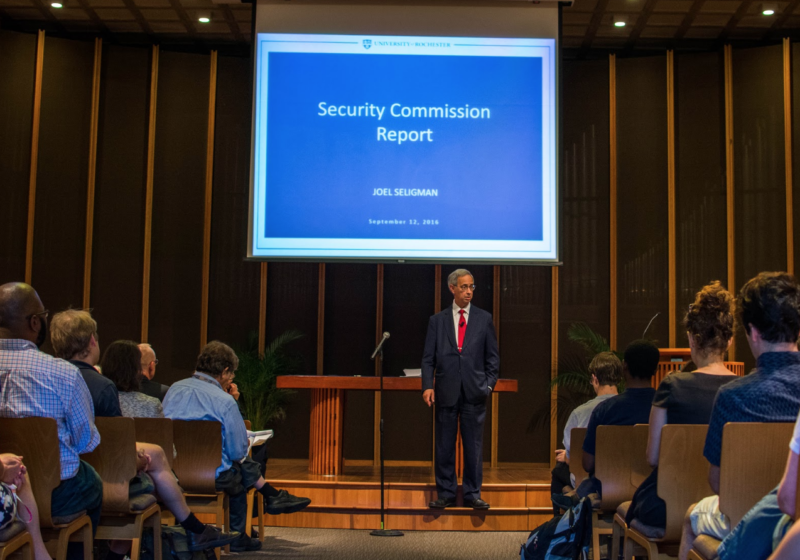Perturbed by the prospect of arming Public Safety officers, UR students and employees worried at two recent town halls that officers with guns could heighten racial tensions and make UR feel less safe.
University President Joel Seligman held two hour-long town hall meetings on Monday afternoon, the first at the River Campus and the second at the Medical Center, to discuss and get feedback on the UR Security Commission’s recent recommendation to arm 38 sworn Department of Public Safety (DPS) officers at the Medical Center as well as the four most senior DPS officers.
Guylda Richard, a third-year medical student on the Presidential Commission on Race and Diversity, is “absolutely terrified” of the idea of arming guards.
“The fear that I’m expressing to you now is not unique to me,” she said at the Medical Center meeting.
She said the overwhelming response from minority students she spoke to was “‘I am terrified, I’m scared, this is not going to end well for me, this is not going to end well for patients who look like me.’”
As junior Daniel Southwell spoke at the River Campus forum in the Interfaith Chapel, he stepped from the microphone and spread his hands to demonstrate how a University parking agent’s car followed him and his friend as they drove on campus.
“This bias that might be unconscious is very much active,” he said in an emotional speech.
DPS patrol sergeant Edson Sawyers, speaking later at the chapel, said that as an officer who “will gladly lay down my life so that you can go home,” he does “not feel safe.”
“So when we start talking about what safety firearms bring or do not bring,” he added, “don’t forget about the view or the feeling of those willing to put their lives on the line for each and every one of you.”
Seligman cited incidents which had exacerbated that fear in recent years among Public Safety officers—last winter’s kidnapping and brutalization of two UR seniors and the August mugging of an undergraduate by a 12-year-old with a gun.
Assistant Professor of Religion Joshua Dubler saw the recommendation as an extension of the “folk wisdom” that good guys with guns will stop bad guys with guns.
Addressing the DPS officers present, he raised his voice: “You guys bear a burden, I understand, and that to me is fair. You should bear the burden. You’re grown-ups, and you’re trained, and you’re compensated.”
Attendees also criticized the evidence behind the Commission’s recommendation. They felt that comparisons between UR and other universities were insubstantial, and that there was a lack of data showing that arming officers with guns would increase safety.
“Virtually every similar research university in the country has some armed officers. Virtually every comparable academic health care center,” Seligman said in turn.
UR is the only member of the Association of American Universities, a group of prominent research institutions in the U.S. and Canada, with an unarmed sworn department. Only one of the 60 U.S. schools in the association has only non-sworn officers.
He acknowledged that other institutions may have based their decisions on local anecdotes or convictions, though he cited the University of Pennsylvania as an example in which reduced violence followed an increase of security forces, including armed forces.
Much of his reasoning in support for the move dealt with pleas from Medical Center employees.
“I have to deal with a different kind of data that’s very powerful,” he said. “I have an emergency department right now who is pleading—pleading—we feel unsafe. How long are you going to take to adjust this?”
Michael Kamali, the UR Medical Center Chair of Emergency Medicine, said that he ultimately supported arming Public Safety. But if he “could have [his] wish come true,” society would have to look at guns as a public health crisis and “think about what is going on.”
DPS officers feel like part of the Rochester community, Director of Public Safety Mark Fischer said, and the department does not tolerate bias.
It has received five allegations of racially motivated behavior in the past three years, four of which stemmed from a miscommunication.
The Commission’s report recommends 28 hours of bias and diversity training with refresher courses every six months, as well as additional background checks and psychological evaluations for officers.
Some, like Southwell, have questioned whether this would be enough.
Seats at the Interfaith Chapel, which held the first town hall meeting from 3-4 p.m., were sparsely filled at a time overlapping with classes. Students criticized the timing, and attendees felt that both town hall meetings had been poorly advertised.
Though Seligman had originally planned to hold three town hall meetings—one each at the River Campus, Medical Center, and Eastman School of Music—he has scheduled a fourth at the River Campus on Monday, Sept. 19, from 6-7 p.m. in the Hawkins-Carlson Room of Rush Rhees Library.
“I hate guns. I hate violence,” Seligman said at both town halls. He wished that the issue did not need to be considered.
He will only make a decision about the recommendation after another town hall on Monday, a meeting with the Faculty Senate, and a meeting with the University’s management team, and again encouraged community members to email their thoughts to him at president@rochester.edu by Sept. 23. He insisted that he would read every email he received.
As for concerns that arming Medical Center officers would make it easier to arm officers on the River Campus, Seligman said that there is no hidden agenda: “No one should get the sense that this is the camel’s nose in the tent.”





